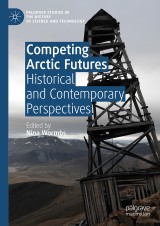Details

Competing Arctic Futures
Historical and Contemporary PerspectivesPalgrave Studies in the History of Science and Technology
|
117,69 € |
|
| Verlag: | Palgrave Macmillan |
| Format: | |
| Veröffentl.: | 06.08.2018 |
| ISBN/EAN: | 9783319916170 |
| Sprache: | englisch |
Dieses eBook enthält ein Wasserzeichen.
Beschreibungen
<p></p><p>This edited collection explores how narratives about the future of the Arctic have been produced historically up until the present day. The contemporary deterministic and monolithic narrative is shown to be only one of several possible ways forward. This book problematizes the dominant prediction that there will be increased shipping and resource extraction as the ice melts and shows how this seemingly inevitable future has consequences for the action that can be taken in the present. This collection looks to historical projections about the future of the Arctic, evaluating why some voices have been heard and championed, while others remain marginalised. It questions how these historical perspectives have shaped resource allocation and governance structures to understand the forces behind change in the Arctic region. Considering the history of individuals and institutions, their political and economic networks and their perceived power, the essays in this collection offer newperspectives on how the future of the Arctic has been produced and communicated.</p><br><p></p>
<p>Chapter 1 Introduction Back to the Futures of an Uncertain Arctic; Nina Wormbs.- Chapter 2 Constructing Arctic Energy Resources: The Case of the Canadian North, 1921-1980; Paul Warde.- Chapter 3 Extracting the Future in Svalbard; Dag Avango.- Chapter 4 “Red herring”: The Unpredictable Soviet Fish and Soviet Power in the 1930s; Julia Lajus.- Chapter 5 A Reindeer Herding people? Political Visions of Sami Futures; Patrik Lantto.- Chapter 6 Creating a Safe Operating Space for Business: The Changing Role of Arctic Governance; Annika E. Nilsson.- Chapter 7 Voicing Bipolar Futures: The Antarctic Treaty System and Arctic Governance in Historical Perspective; Lize-Marié van der Watt and Peder Roberts.- Chapter 8 Political regime influences in the Barents Euro-Arctic Region; Alexander Gnatenko and Andrian Vlakhov.- Chapter 9 The Telecoupled Arctic: Assessing Stakeholder Narratives of Non-Arctic States; Eric Paglia.- Chapter 10 Arctic Modernism: New Urbanisation Models for the Soviet Far Northin the 1960s; Ekaterina Kalemeneva.- Chapter 11 Conclusion Anthropocene Arctic: Reductionist Imaginaries of a “New North”; Sverker Sörlin.</p>
<p></p><p>Nina Wormbs is Associate Professor at KTH Royal Institute of Technology, Stockholm, Sweden. She has worked on media history and recently on environmental history and climate change. She co-edited, with Christensen and Nilsson, <i>Media and the Politics of Arctic Climate Change </i>and contributed to the edited collection <i>The New Arctic.</i></p><br><p></p>
<p></p><p>This edited collection explores how narratives about the future of the Arctic have been produced historically up until the present day. The contemporary deterministic and monolithic narrative is shown to be only one of several possible ways forward. This book problematizes the dominant prediction that there will be increased shipping and resource extraction as the ice melts and shows how this seemingly inevitable future has consequences for the action that can be taken in the present. This collection looks to historical projections about the future of the Arctic, evaluating why some voices have been heard and championed, while others remain marginalised. It questions how these historical perspectives have shaped resource allocation and governance structures to understand the forces behind change in the Arctic region. Considering the history of individuals and institutions, their political and economic networks and their perceived power, the essays in this collection offer newperspectives on how the future of the Arctic has been produced and communicated.</p><br><p></p>
Explores how narratives about the future of the Arctic have been produced historically up until the present day Questions why some voices have been heard while others are marginalised, challenging the dominant narrative in media and policy discourse Evaluates the actions of individuals and institutions, their political, economic, technological and ethical contexts, and the means through which they communicate their visions and politics
“Taking aim at historical exceptionalism and geographical determinism, this tightly argued volume contemplates Arctic futures and future Arctic(s). Stretching far and wide, high and low, they offer a set of theoretical approaches, ethical dispositions, historical methods for making sense of the human and non-human geographies and temporalities. Highly recommended.” (Klaus Dodds, Royal Holloway, University of London, UK, and co-author of The Arctic: What Everyone Needs to Know, 2019)<p> “This book is a provocative and rich contribution to the literature on the history and futures of the “many Arctics”, with a superb and timely challenge to the reductionist tendency in current debates. A stimulating mix of cases and regional accounts illuminate the complexity of competing and diverse futures, and are well placed within a framework of interconnected dimensions of voices, resources and governance.” (Joan Nymand Larsen, Stefansson Arctic Institute, Iceland)</p>
<p>“This inspiring volume offers fresh insights into how people project Arctic futures and the power relationships surrounding these predictions. This rich array of historical perspectives encourages us to interrogate common assumptions about the “inevitability” of the Arctic opening up to shipping and resource extraction in a linear, predictable manner in the twenty-first century.” (P. Whitney Lackenbauer, Professor and Canada Research Chair in the Study of the Canadian North, Trent University, Canada)</p>
<p>“This inspiring volume offers fresh insights into how people project Arctic futures and the power relationships surrounding these predictions. This rich array of historical perspectives encourages us to interrogate common assumptions about the “inevitability” of the Arctic opening up to shipping and resource extraction in a linear, predictable manner in the twenty-first century.” (P. Whitney Lackenbauer, Professor and Canada Research Chair in the Study of the Canadian North, Trent University, Canada)</p>

















